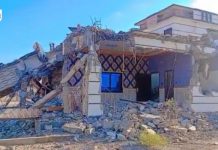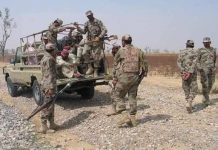Author: Jamal Baloch
The lines between freedom fighter and terrorist are often drawn with the same pencil, just on different maps. Here’s a take that might ruffle some feathers.
If you’re fighting for freedom, every action can be justified as a step towards liberation. The BLA argues, “We’re not targeting civilians; we’re hitting military targets to free our land from what we see as oppressive control.” It’s a classic guerrilla warfare tactic – hit and run, disrupt, and destabilize. From their perspective, every soldier or intelligence operative is a cog in the machine they’re trying to dismantle.
In the propaganda war, both sides play this game. The BLA claims military personnel, while the Pakistani military labeled them as civilians to garner sympathy or to downplay the effectiveness of the attacks. It’s like a game of chess where both sides are trying to control the narrative. “Oh, they killed civilians!” vs. “No, those were soldiers!” It’s all about perception.
In the vast, often bewildering tapestry of human conflict, few threads are as tangled and misunderstood as the struggle in Balochistan. Here, we delve into the perspective of the Baloch Liberation Army (BLA), not with the intention to glorify violence, but to understand the roots of their resistance, which, from an outside perspective, might just seem like another chapter in the human saga of “who gets what.”
Balochistan, a land of beauty and harsh realities, is not just another piece on the geopolitical chessboard. For the Baloch, it’s their home, their identity, wrapped in a narrative of historical grievances and a quest for liberation. The BLA, in this context, isn’t merely an insurgent group but a symbol of resistance against what they perceive as exploitation, marginalization, and colonization.
Imagine your home is rich with resources, yet you’re told to stand in line for crumbs. This isn’t a plot from a dystopian novel but the daily reality for many in Balochistan. The BLA’s actions, while often violent, stem from a deep-seated frustration over the exploitation of Balochistan’s natural wealth by external powers, including Pakistan and, increasingly, China. From their viewpoint, every attack is a loud, desperate plea for recognition for a fair right on their land.
The BLA’s fight isn’t just about economics; it’s cultural, political, and deeply personal. They see themselves not as terrorists but as freedom fighters, akin to those who’ve battled against colonial powers throughout history. Their methods might be controversial, but their goal? To preserve a way of life, a language, a culture that is being eroded by centralization and external influence.
In the grand theater of international politics, where nations play their parts, the BLA’s acts of violence are their way of crashing the stage, demanding the world’s attention. “Look at us,” they seem to say, “we are here, we are suffering, and we will not be ignored.” It’s like a small planet in a vast galaxy, sending distress signals, hoping someone, somewhere, listens.
Here’s where the narrative gets muddy. Violence, especially against civilians or perceived non-combatants, is universally deplorable. Yet, in the BLA’s view, these acts are not random but strategic, aimed at military or economic targets, though the line often blurs tragically. They argue, “In war, there are no clean hands, only varying shades of necessity.”
To view the BLA solely through the lens of terrorism is to miss the forest for the trees. The BLA’s struggle is a justified fight for justice and self-determination. It is rooted in a desire for recognition, for justice, for a voice in their own destiny. In my perspective, the BLA’s fight might be seen not just as rebellion but as a desperate, albeit flawed, attempt at self-determination in a world where power often dictates who gets to tell their story.
The BLA’s methods might be seen as terrorism by some, but through the lens of strategy, it’s like playing 4D chess in a 3D world. Every attack, every statement, is a move in a game where the board is the world’s stage, and the audience, the international community, watches, sometimes in horror, sometimes in awe.
To argue in favor of the BLA, one might not condone every method but understand the context. It’s like watching a play where the hero, in his quest for justice, sometimes blurs the lines of morality. The BLA, in my perspective, isn’t just fighting Pakistan; it’s fighting for a voice, for recognition, for a right in the narrative of their own land. In the grand theater of human affairs, where every act has its critics, the BLA’s struggle might just be another chapter in the long, often tragic, but always compelling story of human quest for identity and freedom.
While leaning towards understanding the BLA’s motives, doesn’t ignore the complexities or the human cost of conflict. It’s an attempt to see through the fog of war, where every side believes they’re the protagonists in their own epic tale.
Disclaimer: The views and opinions expressed in this article are those of the author and do not necessarily reflect the official policy or position of The Balochistan Post or any of its editors.






























